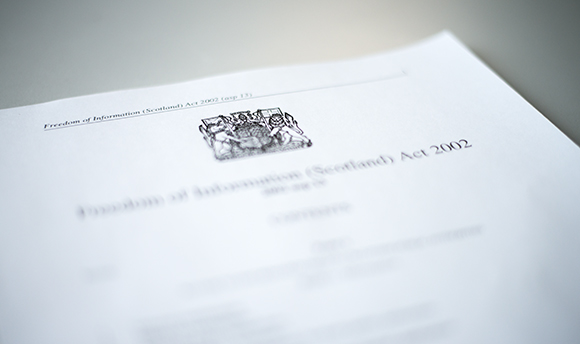Anti-Bribery Policy
Anti-Bribery Policy Statement
Bribery can be defined as the offering, promising, giving, accepting or soliciting of an advantage as an inducement for an action which is illegal or a breach of trust.
The University prohibits the offering, the giving, the solicitation or the acceptance of any bribe, whether cash or other inducement:
- to or from any person or company, whether a public official or public body, or a private person or company, wherever situated;
- by any individual employee, agent or other person or company acting on the University’s behalf;
- in order to gain any commercial, contractual or regulatory advantage for the University in a way which is unethical;
- in order to gain any personal advantage, pecuniary or otherwise, for the individual or anyone connected with the individual.
1 Scope
This policy applies to all Queen Margaret University staff, whether permanent or temporary, to students, members of the University Court, contractors and others directly involved in delivering University business activities or acting on the University’s behalf.
2 Introduction
It is Queen Margaret University’s policy to conduct its business in an honest way and to reject the use of corrupt practices or acts of bribery to obtain an unfair advantage.
The University is committed to the highest standards of ethical practice and governance, setting high standards of impartiality, integrity and objectivity in relation to the stewardship of public and private funds for which it is responsible, and for the management of its activities. This commitment will be reflected in every aspect of the way in which it operates, not only because it is a legal requirement, but on the basis of it being a cultural commitment on the part of the University.
3 Statutory background
The UK Bribery Act 2010 sets out four general bribery offences. These relate to:
- Circumstances involving bribing another;
- Circumstances involving being bribed;
- A failure by a commercial organisation to prevent bribery;
- Bribery of foreign public officials.
A briefing paper produced by the UK HE International Unit, titled ‘A Legal Guide to UK Anti-Bribery and Corruption’, provides further guidance on these provisions.
Active bribery, that is bribing another, ‘is the giving, promising or offering of a bribe with intent to induce improper conduct by the recipient of the bribe. This extends to both cash and non-cash benefits.’
Passive bribery, that is being bribed, ‘is the requesting, accepting or agreeing to receive a payment or other advantage in return for the improper performance of a function or activity. The offence is committed even if the person requesting the bribe does not benefit personally.’
In relation to the offence around failure to prevent bribery in a commercial organisation, the briefing paper states that:
‘This offence is one of strict liability meaning that, if the HEI fails to prevent an Associated Person from paying a bribe for its benefit (active bribery only), the offence is committed regardless of knowledge or intention. It is irrelevant that the HEI was unaware of the bribe being paid. This offence does not include any notion of improper conduct. It simply requires a payment or other advantage for the winning or retention of business.’
There is a defence available where the University can demonstrate that there were adequate procedures in place to minimise the risk of bribery occurring.
The offence concerning foreign public officials requires that the HEI or third party intermediary actively bribes a foreign public official in their capacity as such with the intention of retaining or creating business for the HEI.
4 Penalties for committing an offence
While the University’s disciplinary procedures will be invoked as necessary, there are substantial legal penalties for failing to comply with legislation:
- The offences of bribing another person, being bribed and bribing a foreign public official are punishable on indictment either by an unlimited fine, imprisonment of up to ten years, or both.
- The corporate offence of failure to prevent bribery is punishable on indictment by an unlimited fine.
- Businesses that have been convicted of corruption could find themselves permanently debarred from tendering for public-sector contracts.
- A business may also be damaged by adverse publicity if it is prosecuted for an offence.
Ignorance of the legislation is not an excuse.
5 Application
The UK Bribery Act 2010 applies to all activities, no matter where they are carried out in the world. This policy therefore applies to ALL of the University’s activities worldwide, whatever the local law, practice or custom may be.
It is the responsibility of each staff member, Court member, contractor and others directly involved in delivering University business activities, or acting on the University’s behalf, to:
- comply with all relevant legislation countering bribery and corruption, in particular the Bribery Act 2010;
- take all action and comply with all prohibitions required by this policy and its associated procedures;
- identify and report bribery situations where there is a suspicion or risk of bribery;
- consider their related duties to make appropriate disclosures.
6 Purpose
The purpose of this Policy is to set out the measures the University has put in place to mitigate its exposure to bribery by:
- Setting out a clear anti-bribery policy.
- Ensuring that formal anti-bribery risk assessments are carried out periodically, and that the results are shared with all staff and with the University Court.
- Training all staff so that they can recognise and avoid the use of bribery by themselves and others.
- Encouraging staff to be vigilant and to report any suspicion of bribery, providing them with suitable channels of communication and ensuring sensitive information is treated appropriately.
- Investigating instances of alleged bribery.
- Taking firm action against any individual(s) involved in bribery.
- Monitoring the implementation of the policy.
- Reviewing the policy annually or in the event of legislative changes or changes in the University’s business.
Compliance with this policy is mandatory, as endorsed for University-wide adoption by the Senior Leadership Team and the University Court. Any breach of this policy will be regarded as a serious matter by the University, and could result in disciplinary action.
This policy forms part of a suite of anti-bribery measures, and should be read in conjunction with the following:
- Anti-fraud policy.
- Procurement strategy.
- Expenses & benefits manual.
- Gifts, gratuities and hospitality policy.
- Whistleblowing policy (Public Interest Disclosure).
- Code of Conduct for members of the University Court.
7 Role of Managers
Managers should ensure all of their members of staff are aware of this policy and of their responsibilities to act in accordance with its procedures.
8 Anti-Bribery Measures
a) Corporate Risk Register
Effective risk assessment lies at the core of the success or failure of this policy as it identifies the specific areas where the University is exposed to the risk of bribery, allows those risks to be evaluated and appropriate risk mitigation to be put in place.
The University Corporate Risk Register is reviewed quarterly by the Strategic Leadership Team (SLT), at which time, each member of the SLT is required to review the adequacy and appropriateness of their local risk registers, and to identify any risks that are sufficiently serious to require them to be escalated and included in the University level Corporate Risk Register. However, risk assessment must be a continuous process. Schools and professional services departments need to ensure that they continue to review, monitor and repeat risk assessments (including the risk of bribery) as the business evolves and external circumstances change.
b) Gifts, Gratuities and Hospitality
The procedures governing the acceptance of gifts and hospitality are detailed in the Gifts, Gratuities and Hospitality Policy, and in Section 11 of the University Financial Regulations.
The University gift and hospitality register is held in the office of the Director of Operations & Finance . Any member of staff in receipt of any gift or hospitality, must record such receipt and advise the office of the Director of Operations & Finance. The receipt will be recorded and entered into the University gifts and hospitality register.
c) Donations
All donations receivable by the University will be subject to an approval process that asks specific questions related to the purpose of the gift and the bona fides of the organisation or individual offering the donation. The Deputy Principal is responsible for ensuring that appropriate checks have been carried out before any donation is accepted. Authority for accepting any individual donation with a value in excess of £500,000 remains with the University Court. No donations will be accepted where it is known that the individual is desirous of a University award or honour.
d) Register of Interests
Section 11 of the University’s Financial Regulations (“Code of Conduct”) sets out the procedure to be followed in the event that a senior member of University staff or a member of the University Court is aware that he/she has any interest, financial or otherwise, which is likely to or would, if publicly known, be perceived as being likely to influence the exercise of independent judgement.
Members of the University Court, members of the Senior Leadership Team and Heads of Division and Department are required to make an annual declaration setting out their personal interests. This includes details of business interests, company directorships, trusteeships and memberships of organisations or public bodies where they have a position of general management or control. Any such interests held by a member of their immediate family (spouse/partner, siblings, children or parents) must also be disclosed.
The Register of Interests is reviewed by the University Secretary’s Office at least annually. The interests of members of the University Court and members of the Senior Leadership Team are published on the University website.
e) Procurement of Services
The procedures governing services procured from a third party are set out in section 21 of the University’s Financial Regulations.
All contracts must include a standard anti-bribery clause.
f) Agency Agreements
All agency agreements and contracts must include a standard anti-bribery clause.
g) Public Interest Disclosure Policy
The University’s Public Interest Disclosure Policy (‘Whistleblowing’) provides a channel through which staff can raise concerns and report alleged breaches, in confidence.
9 Implementation: Communication & Training
Implementing, promoting and embedding this anti-bribery policy throughout the institution is a key part of protecting the University from liability under the Bribery Act 2010. The University will act to ensure that staff, members of the University Court and those organisations that work on the University’s behalf are made aware of the University’s Anti-Bribery Policy, and the University’s Public Interest Disclosure Policy (‘Whistleblowing’).
The implementation strategy comprises the following steps:
An e-learning module on the Bribery Act 2010 is available for all staff, and training records maintained and reviewed regularly.
- All staff and external bodies, including agents, contractors and suppliers working on the University’s behalf, will be made aware of the University’s Anti-Bribery Policy.
- The Anti-Bribery Policy will be published on the University website.
- Training provided to all staff will ensure that they are aware, not only of their obligations and responsibilities under the Act, but of the consequences of breaching those obligations and responsibilities.
- To comply with the University’s Anti-Bribery Policy, employees will carry out appropriate due diligence checks before engaging agents, suppliers and other third parties. Examples of relevant evidence will include negative news reports, warnings or sanctions involving the potential business partner, as well as any association with politically exposed persons, which may present an increased risk of bribery and corruption.
- Additional due diligence will be exercised for high-risk third parties, including agents, external-facing consultants, distributors, third parties interacting with government officials and those operating in high-risk markets.
- Deans and Heads of professional support services are responsible for ensuring that properly documented due diligence is undertaken. General oversight after the contract is signed must also be undertaken.
- As the Act also applies to “associated persons” such as agents, suppliers and contractors, staff must ensure that, during the due diligence process, checks are made to establish whether external organisations have any equivalent anti-bribery policies or training in place. If no such policy is in place, the “associated person” must be advised of the University’s requirements, that is, that the University expects them to acknowledge and observe the University’s Anti-Bribery Policy and that failure to adhere to this will result in the University exercising its option to terminate the contract or agreement.
- Where a report raises a concern, this must be discussed with the Dean or Head of Department, and highlighted clearly in the documented due diligence report to be submitted to the Senior Leadership Team. Where concerns cannot be mitigated, this will result in the relationship or third party transaction not progressing.
- All interactions with associated parties must be clearly documented.
- All proposed agreements with agents and other intermediaries must have the prior approval of the relevant member of the Senior Leadership Team, in line with the delegated authority schedule.
- Any breach of the Act by a member of staff will be treated as a disciplinary matter, independent of legal sanction.
- The Students’ Association is responsible for ensuring its staff and students are aware of their responsibilities to comply with the University’s Anti-Bribery Policy and associated procedures
10 Accountability, Monitoring and Review
Accountability for the implementation, review and appropriate revision of this policy and its underlying principles resides with the Senior Leadership Team. The Senior Leadership Team will report periodically to the Audit & Risk Committee on the outcome of its review of the suite of anti-bribery measures.
Deans, Heads of Division and Heads of Professional Service areas are responsible for ensuring that this Anti-Bribery Policy and its associated policies and procedures are implemented in the routine discharge of the business in their specific areas, and for the ongoing monitoring of compliance with these policies.
This Anti-Bribery Policy will be reviewed every two years, and more frequently in the event of any legislative changes, or relevant changes in the University’s activities.
Deans, Heads of Divisions and Heads of Professional Services functions are responsible for ensuring that staff reporting to them understand and comply with the anti-bribery measures that have been put in place to support the implementation of the Anti-Bribery Policy. Such understanding and compliance must be reviewed periodically.
Deans, Heads of Divisions and Heads of Professional Services functions must monitor significant contractors and suppliers as part of the regular review of relationships with them.
It is the responsibility of individual members of staff to ensure that they comply with the requirement to declare the receipt of any gift or hospitality or any conflict of interest.
The University’s internal auditors will monitor the systems of internal control, risk management and governance arrangements, which will include the adequacy of the anti- bribery procedures.
11 How to Raise a Concern
The prevention, detection and reporting of bribery is the responsibility of all University employees. If members of staff are concerned that a corrupt act of some kind is being considered or carried out by any member of staff, member of the University Court or third party acting on behalf of the University, they must report this to their line manager, who will raise this with the University Secretary.
If staff are not comfortable with speaking directly to a colleague, the process by which employees and others can report confidentially any suspicion of bribery is governed by the University’s Public Interest Disclosure Policy (Whistleblowing).
12 Investigation of Concerns Raised under Whistleblowing
The University Secretary is the person designated by the University to receive any Whistleblowing disclosures. The University Secretary performs that role in their capacity as Secretary to the University Court. Where a disclosure is made, the University Secretary will inform the Principal and Chair of the University Court unless the person making the disclosure requests them not to do so for good reason. The Chair of the University Court is likely to be involved in the event of any subsequent appeal.
If a person does not wish to raise the matter with either the University Secretary or the Principal because it involves either or both of them, then the matter may be raised with the
Convener of the Audit and Risk Committee or with the Chair of the University Court.
In cases involving alleged financial wrongdoing, the University Secretary will act throughout in close consultation with the Principal, who is the designated Accounting Officer for the University’s public funding.
Managers should ensure all staff reporting to them are aware of the Public Interest Disclosure Policy and of their responsibilities to act in accordance with its procedures.
Approved by Senior Leadership Team - September 2020
Review date – September 2022


